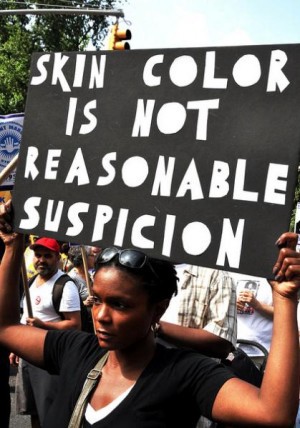New York City Was Revolutionized Last Night
by Brendan O’Connor

“Remember the 1990s? We’re going back,” said Councilman Peter Vallone last night. We remember! Sounds great.
New York City’s Community Safety Act was made up of two bills: one that would expand New Yorkers’ ability to sue the Police Department for profiling, and one that would increase government oversight of the department. Last night both passed with a veto-proof majority just after 2:20 a.m., at which point Councilman Jumaane D. Williams, who introduced the bill with Councilman Brad Lander last year and spoke movingly in support of it, jumped up from his chair and pumped his fists.
But before the victory, everyone mixed it up a little. Williams criticized those who would oppose the End Discriminatory Profiling Act, arguing that opponents of the bill did not represent constituencies directly affected by the police practices it is written to ameliorate. “The vast majority who I know are planning to vote against 1080 do not represent the people who deal with gun violence in their communities,” he said. “If you don’t live there, if you haven’t lived through it, if you don’t represent these communities — please, side with us.” The majority of the City Council’s black and Latino caucus supported the CSA.
“Historically there has been a paternalistic response to these communities saying what they need,” Williams continued. “Pay us the same respect that we pay you.”
Charles Barron, who was up in the balcony shaking hands and joking with supporters when roll was called, spoke with a cheerful rage that contrasted with Williams’ quiet passion. “When the mayor doesn’t like it and the commissioner doesn’t like it, it has to be good for the City of New York,” he said. Barron voted in support of both CSA bills — but he voted no on the budget. Both these bills and the budget for the next fiscal year were voted on simultaneously. (The budget passed as well.)
“The budget sometimes is more brutal than the police,” Barron said. “We need to look at this budget as diligently as we look at stop-and-frisk.”
Opposition to the Community Safety Act was led by Councilmen Peter F. Vallone, Jr. and Eric Ulrich. (When we last met Vallone, he was shilling for Big Foam, and before that, Big People Who Hate Awls. Now he rests snugly in the pocket of Big Civil Rights Violations.)
“When the courts are in charge, we will become Chicago. We will become Detroit,” Vallone said. “Children will die.”
“It’s not fear-mongering if it’s true,” he said.
Councilman Barron questioned his credentials as a champion of the public good. “I have spent my life keeping New York safe from people like you,” Vallone said.
“It’s an election year,” said his buddy Ulrich. “We all want to pander… Give me a break. I will not be intimidated by the professional police critics, by the panderers, by the media. This is an outrage.”
Ulrich is a Republican from Queens and the youngest member of the City Council. “Instead of criticizing the job the cops have done,” he said, “we should be thanking them for a job well done.”
“I wanna live in a safe city,” he said. “I wanna live in a city that is safe from fear.”
Councilman Donovan Richards, who represents neighborhoods in Brooklyn and Queens, also expressed a desire to live in a city that is safe from fear, describing the panic he felt, starting at the age of 16 when he was first stopped-and-frisked, whenever a police cruiser would appear in his rear-view mirror.
With the passage of CSA, however, things are changing. “Today, I’m not scared. Today, I’m elected,” Richards said. “And I have a chance to do something about it.”
Struggling author, mayoral candidate and Council Speaker Christine Quinn split her support, voting ‘yes’ on the Oversight Act and ‘no’ on the End Discriminatory Profiling Act. “Some have suggested that putting this type of monitoring in place will make the city less safe,” she said, going on to note that crime has dropped 38% and police approval has risen 84% following passage of similar legislation in Los Angeles. “One thing that will make this city less safe is if New Yorkers feel at odds and not united with their police department.”
Yet she still voted no. Quinn fears that the End Discriminatory Profiling Act would allow for too much judicial involvement. Worth noting: her support for the Oversight Act, at least, is a significant break from her Bloomberg lineage.
“I hope this ends in time for brunch,” said Brad Lander late last night. It did. Because in other legislative news, the War on Brunch is over. Sidewalk cafés may now serve before noon. What’s next — mandatory sick leave for New York employees? Oh yes: the Council voted to override Bloomberg’s veto on that too. Last night was an evening of radical change for the city, so, congratulations.
Brendan O’Connor is an Awl summer reporter
. Photo by Michael Fleshman from the demonstrations last year that have led to these changes.
